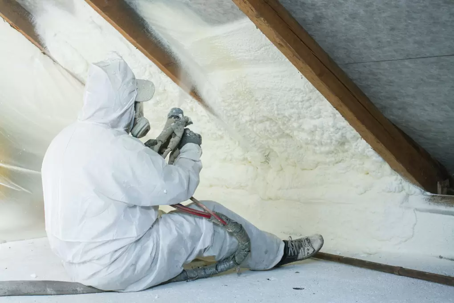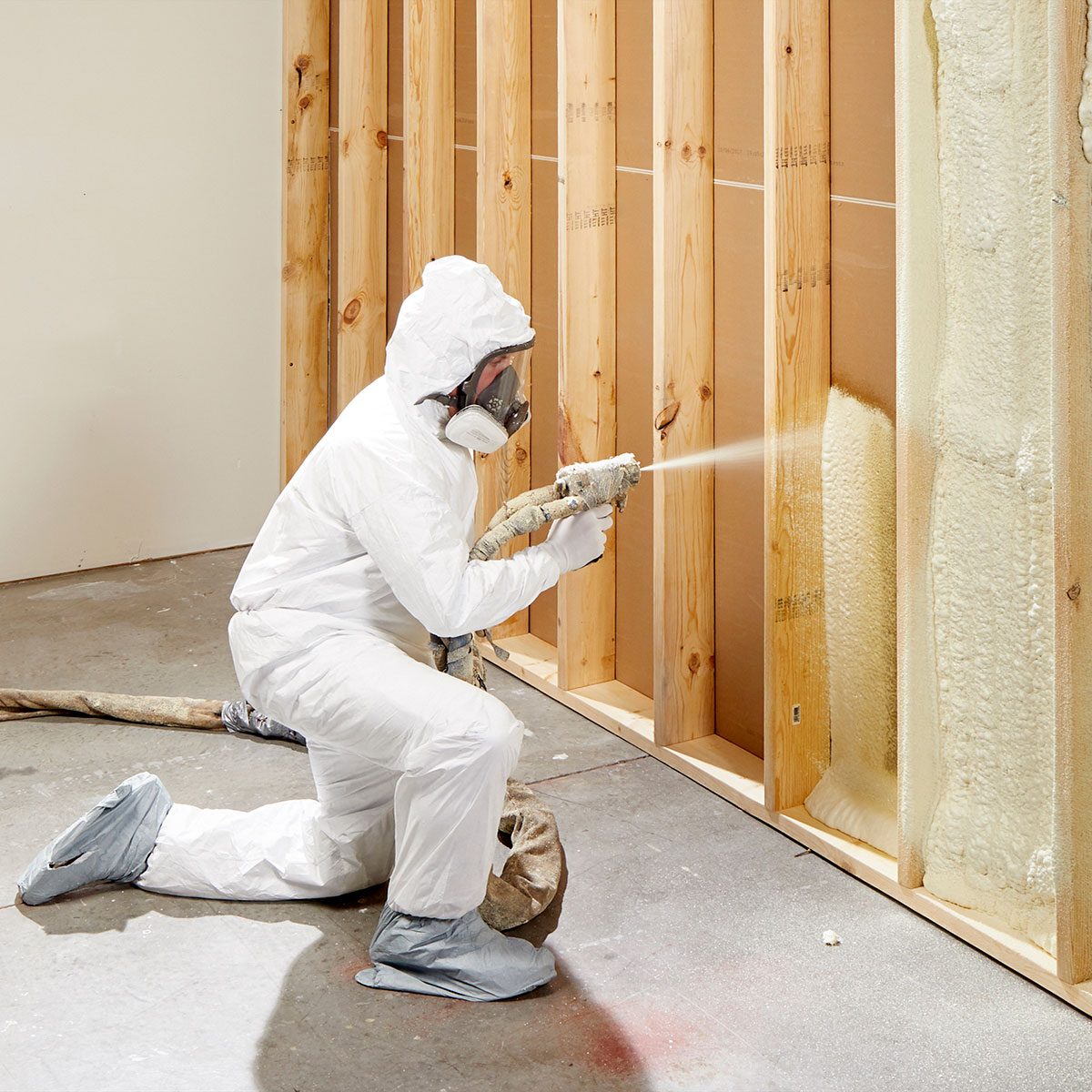How Spray Foam Can Enhance Energy Effectiveness in Your Home
How Spray Foam Can Enhance Energy Effectiveness in Your Home
Blog Article
Spray Foam: The Ultimate Solution for Air Sealing and Insulation
Spray foam insulation has actually emerged as a leading option for efficient air securing and thermal insulation, providing an unique combination of residential properties that set it aside from traditional approaches. Its capability to expand and load voids makes it especially reliable in protecting against air leak, which can considerably impact power performance. However, comprehending the complete scope of its advantages, installation procedures, and comparisons with various other insulation types is critical for making notified choices. As we explore these aspects, the ramifications for both brand-new building and constructions and retrofits become significantly considerable. What elements should affect your choice?
What Is Spray Foam?
Spray foam is a functional insulation material that integrates the concepts of air securing and thermal resistance to improve energy performance in buildings. Composed largely of polyurethane or other similar compounds, spray foam is applied as a liquid that expands upon call with surfaces, developing a solid, continual layer of insulation. This unique home enables it to fill up spaces, fractures, and voids that typical insulation products may overlook, offering an exceptional air seal.
There are 2 main types of spray foam: open-cell and closed-cell. Open-cell spray foam is lighter and more flexible, providing excellent sound absorption and a reduced R-value per inch - Spray Foam. In comparison, closed-cell spray foam is denser, offering a greater R-value, moisture resistance, and included architectural honesty to developing elements
The application procedure typically includes specific equipment, making sure a seamless application that complies with different substratums, including concrete, timber, and metal. This versatility makes spray foam suitable for both brand-new buildings and retrofitting existing frameworks. Its capacity to produce an impermeable obstacle dramatically adds to reducing power consumption and improving interior air high quality, consequently making it a recommended choice among building contractors and homeowners alike.
Benefits of Spray Foam Insulation
Among one of the most considerable advantages of spray foam insulation is its extraordinary capability to produce a continual air obstacle, which effectively reduces energy loss. Unlike conventional insulation products, spray foam broadens to fill up voids and splits, making sure that air leakage is drastically reduced. This particular not only enhances energy performance but also leads to lower energy bills over time.
In addition, spray foam insulation offers remarkable thermal resistance, adding to an extra secure indoor environment. Its high R-value per inch permits reliable insulation in constrained areas, making it ideal for attics, wall surfaces, and crawl rooms. The moisture-resistant buildings of spray foam assistance protect against mold and mildew and mold growth, promoting healthier living problems.
Another vital advantage of spray foam insulation is its sound-dampening high qualities (Spray Foam). It efficiently reduces sound transmission between spaces, developing a quieter and more comfortable home setting. The sturdiness of spray foam likewise attracts attention, as it does not sag or resolve in time, maintaining its efficiency throughout its life-span
How Spray Foam Functions
Recognizing exactly how spray foam insulation works is necessary for appreciating its performance in air securing and thermal resistance. Spray foam insulation contains 2 key elements: isocyanate and polyol resin. When these elements are blended, they undergo a chain reaction that triggers the material to broaden rapidly, producing a thick foam that fills up gaps, tooth cavities, and cracks.
As the foam broadens, it adheres to surfaces, creating an impermeable seal that dramatically decreases air infiltration. This characteristic makes spray foam insulation highly efficient at preventing drafts and wetness penetration, which can lead to power loss and damage with time. Additionally, the closed-cell variant of spray foam offers exceptional thermal resistance due to its rigid structure, properly decreasing heat transfer.
The distinct residential properties of spray foam permit it to comply with uneven surface areas, making certain detailed insurance coverage and a seamless barrier. Consequently, spray foam insulation not only boosts power effectiveness but also adds to boosted indoor air quality by minimizing the build-up of contaminants and allergens. Ultimately, recognizing the mechanics behind spray foam emphasizes its duty as a remarkable selection for insulation and air securing in both domestic and business applications.
Installation Refine Summary

Prior to installment, the room needs to be appropriately cleansed and prepped, making certain that surface areas are devoid of dust, dampness, and particles. Because pollutants can compromise bond and general efficiency, this step is crucial. As soon as the area is prepared, the application includes mixing the 2 elements of the spray foam, which broadens upon contact and fills gaps efficiently.
Educated professionals ought to conduct the installment, making use of customized equipment to guarantee uniform protection and ideal density. Safety and security preventative measures, including wearing safety gear and making certain proper air flow, are critical during this procedure. After application, the foam usually cures swiftly, forming a strong obstacle that enhances energy performance.
Contrasting Spray Foam to Typical Insulation
When assessing insulation alternatives, spray foam insulation stands out in contrast to traditional materials such as fiberglass and cellulose. One of the main advantages of spray foam is its remarkable air sealing capacities. Unlike fiberglass and cellulose, which can permit air seepage, spray foam broadens upon application, loading crevices and spaces to develop an airtight seal. This leads to boosted power performance, as much less heated or cooled air leaves the home, resulting in reduced energy bills.
In addition, spray foam offers a greater R-value per inch than typical insulation types, using even more efficient thermal resistance in a thinner profile. This particular is specifically advantageous in areas with minimal dental caries deepness. Spray foam is resistant to dampness and mold and mildew development, which can be a significant concern with cellulose and fiberglass, specifically in damp settings.
However, spray foam insulation generally look what i found brings a higher in advance price than its traditional counterparts. House owners should weigh this initial investment against long-lasting energy savings and efficiency advantages. Inevitably, while both insulation kinds serve their purpose, spray foam becomes an advanced remedy for modern insulation needs, specifically in terms of air securing and thermal performance.

Verdict
In recap, visit this site right here spray foam insulation represents an extremely effective option for achieving ideal air securing and thermal resistance. Its one-of-a-kind homes, consisting of wetness resistance and audio dampening, make it suitable for numerous applications in both new building and constructions and retrofitting tasks (Spray Foam). Although the initial costs may be higher contrasted to traditional insulation products, the long-lasting benefits, such as substantial power financial savings and enhanced indoor air high quality, warrant the investment and underscore its worth in modern building practices.
Spray foam insulation has emerged as a leading solution for reliable air securing and thermal insulation, using an one-of-a-kind mix of residential properties that establish it apart from standard approaches.Spray foam is a flexible insulation material that incorporates the concepts of air sealing and thermal resistance to improve power performance in structures.When evaluating insulation choices, spray foam insulation stands investigate this site out in comparison to conventional materials such as fiberglass and cellulose. Inevitably, while both insulation kinds serve their function, spray foam arises as a more sophisticated remedy for modern insulation requirements, specifically in terms of air sealing and thermal effectiveness.
In recap, spray foam insulation represents a very effective option for attaining optimum air sealing and thermal resistance.
Report this page